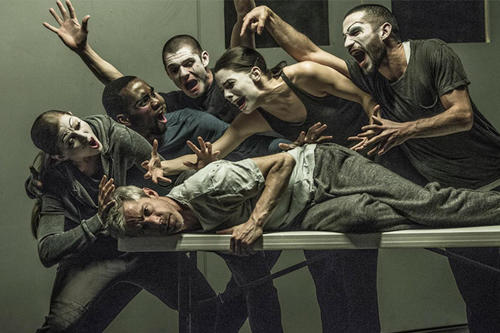
Long before modern science existed, the arts offered solace to those afflicted by pain and grief. From the tragedies of Aeschylus to Brahms’ German Requiem, the arts transform suffering from a shadowy tormentor in the depths of the psyche into a tangible entity that the sufferer can grapple with and, perhaps, defeat.
Today, art and science often work in synch to help those afflicted by emotional trauma, including drug addiction. For example, the power of the arts to affect mood can be visualized in brain scans. And modern techniques of the behavioral sciences—with help from statistics—can discover what therapies, artistic or otherwise, are genuinely effective.
Bringing art to life—and vice versa
The resilience of the human spirit and the healing power of art illuminate the Northrop stage March 21 and 22, when Canada’s Kidd Pivot dance company and Electric Company Theatre present Betroffenheit, an emotionally and visually riveting journey from tragedy and addiction to recovery.
The story of Betroffenheit began in 2009, when Electric Company Theatre’s Jonathon Young suffered a crushing loss that cost him his marriage and threatened his life before he finally made his way to recovery. Reflecting on the experience, he wrote the outline of a one-man play. But a meeting between Young and Kidd Pivot choreographer Crystal Pite led them to create this dance/theater work, which uses original music, text, and movement with puppetry and rich visual design to plumb the depths of the hero’s grief and the struggle to wrest his life from the clutches of despair.
Northrop Director Christine Tschida calls Betroffenheit an example of “that miraculous elevation of life turned into art, where the personal becomes the universal.
“I also believe there is a profound healing quality that the arts provide, and I have long thought we share like-minded goals with the University’s Center for Spirituality & Healing.”
Bringing the audience in
After each performance, the audience is invited to join a panel discussion with performers and researchers from the University of Minnesota who study issues raised in the piece.
March 21: Kate Moos, director of news content development, American Public Media, moderates a conversation hosted by the Center for Spirituality & Healing (CSH) focusing on resilience and wellbeing in the face of addiction. University panelists will be Amy Krentzman, assistant professor, School of Social Work; Ann Becher Ingwalson, lecturer, College of Continuing Education’s Addiction Studies and Integrative Behavioral Health programs; and Alex Haley, assistant professor and CSH mindfulness programs lead.
“We want the audience to be in dialogue with experts and creators of the piece,” says Pamela Cherry, CSH administrative director. "We hope the discussions will address issues important to audience members."
March 22: Andy Steiner, mental health and addiction columnist for MinnPost, moderates a conversation focused on the University’s work to end addiction. Panelists will be Kelvin Lim, professor, Department of Psychiatry, who maps the brain to predict those most likely to relapse; and Mark Thomas, associate professor, Department of Neuroscience, and director, U of M Center for Addiction Neuroscience, who seeks a neural “switch” to turn off relapse behavior.
Both performances start at 7:30 p.m. Due to adult themes, the show is recommended for ages 16 and up. For more information and tickets, see the Northrop event page.
- Categories:
- Health




